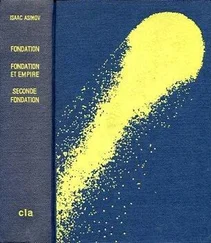1 ...8 9 10 12 13 14 ...54 No sigh of relief was heard but faces brightened. An Elder stroked his beard with thumb and forefinger, straightening its slight curl with a gentle pressure, and said: “We are faithful servants of the Lords of Tazenda.”
Pritcher’s annoyance at Channis’ bald question subsided. It was apparent, at least, that the age that he had felt creeping over him of late had not yet deprived him of his own capacity for making smooth the blunders of others.
He continued: “We do not know, in our far part of the universe, much of the past history of the Lords of Tazenda. We presume they have ruled benevolently here for a long time.”
The same Elder who spoke before answered. In a soft, automatic way he had become spokesman. He said: “Not the grandfather of the oldest can recall a time in which the Lords were absent.”
“It has been a time of peace?”
“It has been a time of peace!” He hesitated. “The governor is a strong and powerful Lord who would not hesitate to punish traitors. None of us are traitors, of course.”
“He has punished some in the past, I imagine, as they deserve.”
Again hesitation, “None here have ever been traitors, or our fathers or our fathers’ fathers. But on other worlds, there have been such, and death followed for them quickly. It is not good to think of for we are humble men who are poor farmers and not concerned with matters of politics.”
The anxiety in his voice, the universal concern in the eyes of all of them was obvious.
Pritcher said smoothly: “Could you inform us as to how we can arrange an audience with your governor.”
And instantly an element of sudden bewilderment entered the situation.
For after a long moment, the Elder said: “Why, did you not know? The governor will be here tomorrow. He has expected you. It has been a great honor for us. We . . . we hope earnestly that you will report to him satisfactorily as to our loyalty to him.”
Pritcher’s smile scarcely twitched. “Expected us?”
The Elder looked wonderingly from one to the other. “Why . . . it is now a week since we have been waiting for you.”
Their quarters were undoubtedly luxurious for the world. Pritcher had lived in worse. Channis showed nothing but indifference to externals.
But there was an element of tension between them of a different nature than hitherto. Pritcher felt the time approaching for a definite decision and yet there was still the desirability of additional waiting. To see the governor first would be to increase the gamble to dangerous dimensions and yet to win that gamble might multi-double the winnings. He felt a surge of anger at the slight crease between Channis’ eyebrows, the delicate uncertainty with which the young man’s lower lip presented itself to an upper tooth. He detested the useless play-acting and yearned for an end to it.
He said: “We seem to be anticipated.”
“Yes,” said Channis, simply.
“Just that? You have no contribution of greater pith to make. We come here and find that the governor expects us. Presumably we shall find from the governor that Tazenda itself expects us. Of what value then is our entire mission?”
Channis looked up, without endeavoring to conceal the weary note in his voice: “To expect us is one thing; to know who we are and what we came for, is another.”
“Do you expect to conceal these things from men of the Second Foundation?”
“Perhaps. Why not? Are you ready to throw your hand in? Suppose our ship was detected in space. Is it unusual for a realm to maintain frontier observation posts? Even if we were ordinary strangers, we would be of interest.”
“Sufficient interest for a governor to come to us rather than the reverse?”
Channis shrugged: “We’ll have to meet that problem later. Let us see what this governor is like.”
Pritcher bared his teeth in a bloodless kind of scowl. The situation was becoming ridiculous.
Channis proceeded with an artificial animation: “At least we know one thing. Tazenda is the Second Foundation or a million shreds of evidence are unanimously pointing the wrong way. How do you interpret the obvious terror in which these natives hold Tazenda? I see no signs of political domination. Their groups of Elders apparently meet freely and without interference of any sort. The taxation they speak of doesn’t seem at all extensive to me or efficiently carried through. The natives speak much of poverty but seem sturdy and well-fed. The houses are uncouth and their villages rude, but are obviously adequate for the purpose.
“In fact, the world fascinates me. I have never seen a more forbidding one, yet I am convinced there is no suffering among the population and that their uncomplicated lives manage to contain a well-balanced happiness lacking in the sophisticated populations of the advanced centers.”
“Are you an admirer of peasant virtues, then?”
“The stars forbid.” Channis seemed amused at the idea. “I merely point out the significance of all this. Apparently, Tazenda is an efficient administrator—efficient in a sense far different from the efficiency of the old Empire or of the First Foundation, or even of our own Union. All these have brought mechanical efficiency to their subjects at the cost of more intangible values. Tazenda brings happiness and sufficiency. Don’t you see that the whole orientation of their domination is different? It is not physical, but psychological.”
“Really?” Pritcher allowed himself irony. “And the terror with which the Elders spoke of the punishment of treason by these kind-hearted psychologist administrators? How does that suit your thesis?”
“Were they the objects of the punishment? They speak of punishment only of others. It is as if knowledge of punishment has been so well implanted in them that punishment itself need never be used. The proper mental attitudes are so inserted into their minds that I am certain that not a Tazendian soldier exists on the planet. Don’t you see all this?”
“I’ll see perhaps,” said Pritcher, coldly, “when I see the governor. And what, by the way, if our mentalities are handled?”
Channis replied with brutal contempt: “ You should be accustomed to that .”
Pritcher whitened perceptibly, and, with an effort, turned away. They spoke to one another no more that day.
It was in the silent windlessness of the frigid night, as he listened to the soft, sleeping motions of the other, that Pritcher silently adjusted his wrist-transmitter to the ultrawave region for which Channis’ was unadjustable and, with noiseless touches of his fingernail, contacted the ship.
The answer came in little periods of noiseless vibration that barely lifted themselves above the sensory threshold.
Twice Pritcher asked: “Any communications at all yet?”
Twice the answer came: “None. We wait always.”
He got out of bed. It was cold in the room and he pulled the furry blanket around him as he sat in the chair and stared out at the crowding stars so different in the brightness and complexity of their arrangement from the even fog of the Galactic Lens that dominated the night sky of his native Periphery.
Somewhere there between the stars was the answer to the complications that overwhelmed him, and he felt the yearning for that solution to arrive and end things.
For a moment he wondered again if the Mule were right—if Conversion had robbed him of the firm sharp edge of self-reliance. Or was it simply age and the fluctuations of these last years?
He didn’t really care.
He was tired.
The governor of Rossem arrived with minor ostentation. His only companion was the uniformed man at the controls of the ground-car.
The ground-car itself was of lush design but to Pritcher it appeared inefficient. It turned clumsily; more than once it apparently balked at what might have been a too-rapid change of gears. It was obvious at once from its design that it ran on chemical, and not on nuclear, fuel.
Читать дальше
Конец ознакомительного отрывка
Купить книгу











